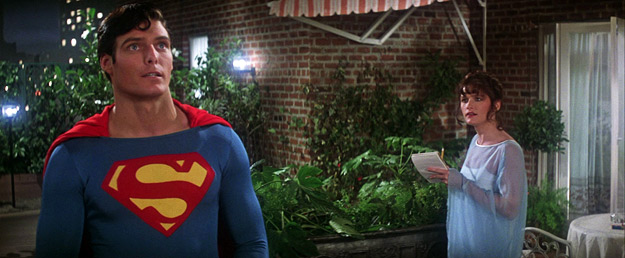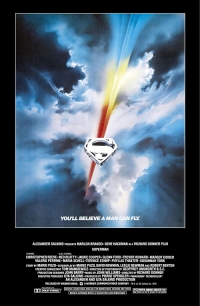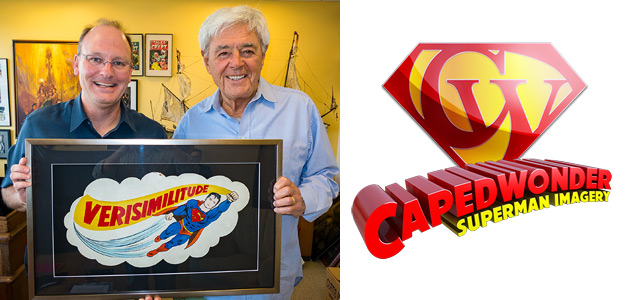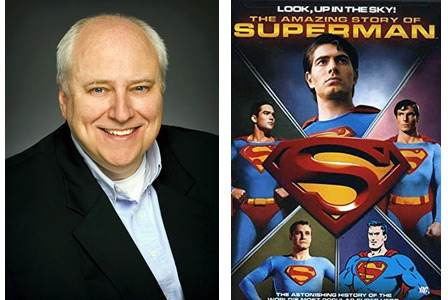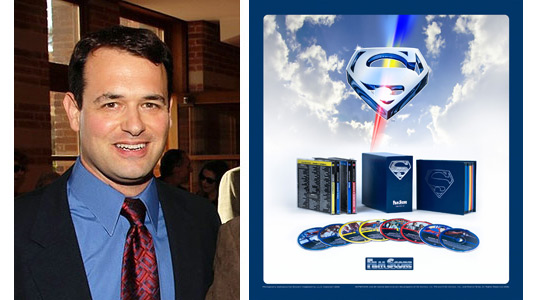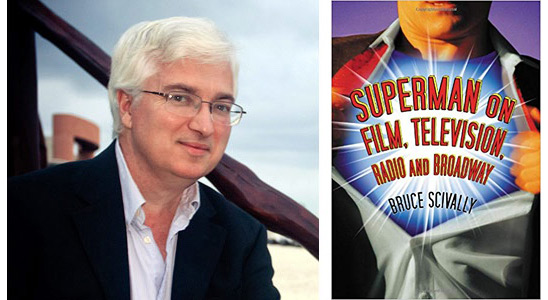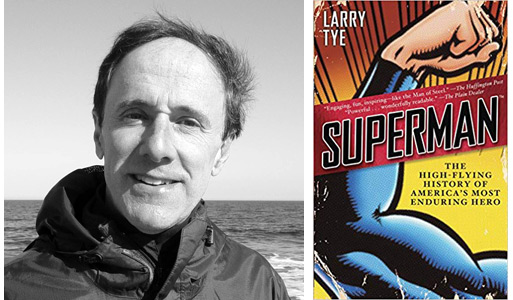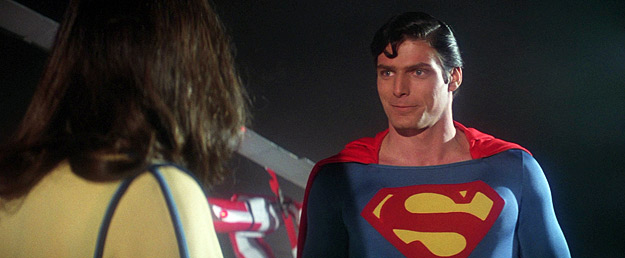
THE 70MM ENGAGEMENTS
The following section of this retrospective features a historical/reference listing of the locales that showcased a 70mm presentation. (For a state-by-state listing of all of the movie’s 500+ opening-weekend bookings, please refer to our 35th anniversary article Still Believing a Man Can Fly: Remembering “Superman: The Movie On Its 35th Anniversary.)
Arguably, the best theaters in which to experience Superman were those showcasing a 70mm print which featured a high-quality Six-Track Dolby Stereo audio experience and were generally shown in larger theaters and with superior quality control. Superman was among only nine first-run films released in 1978 with 70mm prints for selected engagements.
Superman was released in North America on December 15th, 1978. The film’s world premiere, with President Carter in attendance, was held December 10th (in 35mm) at the Kennedy Center in Washington, DC. As well, numerous benefit screenings and regional premieres took place between the 11th and 14th (some in 70mm).
The duration of these engagements (measured in weeks) is included in parenthesis following the theater name. The 70mm bookings of Superman were among the film’s longest-playing and highest-grossing.
It should be noted that the majority of the 70mm print order for Superman was delivered late by the lab due in part to the late completion of the production work. As a result, many of the engagements cited below actually commenced with a 35mm print and switched to 70mm upon delivery of the large-format print.
Also note that some of the presentations included in this listing might have been presented in 35mm during the latter week(s) of engagement due to print damage and the distributor’s unwillingness to supply a 70mm replacement print or because the booking was moved to a smaller, non-70mm-equipped auditorium in a multiplex. Any 35mm portion of an engagement has been included in its duration figure.
And, finally, it should be noted that, as a test, a select few of these 70mm presentations were played back in a special split-surround format. The split surround format, in terms of channel layout, was the precursor to the modern-day 5.1 format. These presentations were considered a test and thus the split-surround component of the presentation was not promoted. Decades later, however, the lack of documentation and promotion has prevented historians and interested parties from determining precisely which venues presented Superman in the split-surround format. (The split-surround decoding equipment had not yet been made available; a prototype of the SA-5 surround adapter for use with the Dolby CP100 was manufactured for the venues in which the test presentations were held. The split-surround format was officially introduced in 1979 with Apocalypse Now.)
The North American first-run 70mm presentations of Superman….
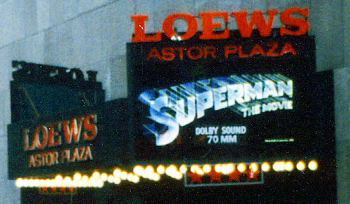
CALIFORNIA
- Costa Mesa — Mann’s South Coast Plaza Triplex (27) [70mm from Week 3]
- Los Angeles (Hollywood) — Mann’s Chinese (22)
- Los Angeles (Westwood Village) — Mann’s National (17)
- Los Angeles (Woodland Hills) — UA’s Warner Center 6-plex (26) [70mm from Week 3]
- San Diego — Mann’s Cinema 21 (7) [70mm from Week 2]
- San Francisco — Pli
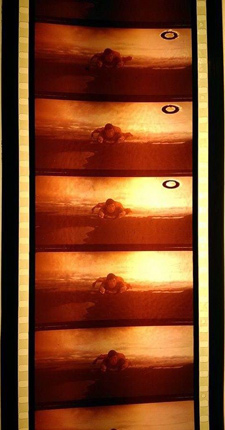 tt’s Northpoint (23) [70mm from Week 2]
tt’s Northpoint (23) [70mm from Week 2] - San Jose — Mann’s Town & Country (25) [70mm from Week 7]
COLORADO
- Denver — Mann’s Century 21 (20+) [70mm from Week 2]
DISTRICT OF COLUMBIA
- Washington — Circle’s Embassy Circle (19) [opened 1-26-79]
ILLINOIS
- Belleville — BAC’s Cinema (13) [70mm from Week 2]
- Calumet City — Plitt’s River Oaks 4-plex (21) [70mm from Week 11]
- Chicago — Plitt’s Esquire (12) [70mm from Week 3]
- Northbrook — Center’s Edens Twin (16) [70mm from Week 3]
- Oak Brook — Plitt’s Oakbrook (21) [70mm from Week 3]
- Schaumburg — Plitt’s Woodfield 4-plex (20) [70mm from Week 3]
KENTUCKY
- Louisville — Redstone’s Showcase 8-plex (22) [70mm from Week 12]
MASSACHUSETTS
- Boston — Sack’s Cinema 57 Twin (13) [70mm from Week 4]
MICHIGAN
- Livonia — NGT’s Mai Kai (23) [70mm from Week 3]
- Southfield — NGT’s Americana 4-plex (23) [70mm from Week 3]
MINNESOTA
- Bloomington — GCC’s Southtown (23) [70mm from Week 3]
- Brooklyn Center — Plitt’s Brookdale (23) [70mm from Week 3]
NEW YORK
- New York — Cinema 5’s Murray Hill (16)
- New York — Loews’ Astor Plaza (16)
- New York — Loews’ Orpheum Twin (17)
OREGON
- Beaverton — LT’s Westgate Triplex (23) [70mm from Week 2]
- Portland — LT’s Eastgate Triplex (23) [70mm from Week 2]
TEXAS
- Dallas — GCC’s Northpark West Twin (21) [70mm from Week 6]
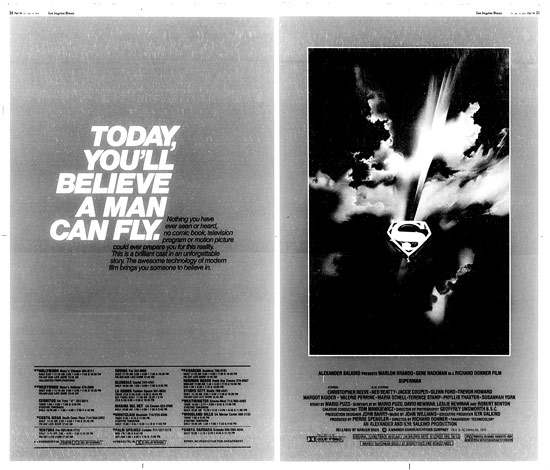
THE Q&A
Jim Bowers is the editor of CapedWonder.com and author of the forthcoming Superman: The Richard Donner Years.
Kevin Burns is the director and executive producer of Look, Up in the Sky! The Amazing Story of Superman (2006).
Mike Matessino is a Soundtrack Producer and Film Music Preservationist and was involved with the Superman soundtrack CDs released in 2000 and 2008.
Bruce Scivally is the author of Superman on Film, Television, Radio & Broadway (McFarland, 2006).
Larry Tye is the author of Superman: The High-Flying History of America’s Most Enduring Hero (Random House, 2012).
The interviews were conducted separately and have been edited into a “roundtable” conversation format. (This Q&A includes a mixture of new and repurposed material from our 35th anniversary coverage.)
Michael Coate (The Digital Bits): How do you think Superman: The Movie should be remembered and/or celebrated on its 40th anniversary?
Jim Bowers: Superman: The Movie is, and always shall be, remembered and celebrated as a Christmas season classic movie experience, with “experience” being the definitive word. Although I often watch the movie in its entirety throughout each year, I also make a point to enjoy it during the holidays alongside The Grinch Who Stole Christmas, A Charlie Brown Christmas, Rudolph the Red-Nosed Reindeer, The Snowman (1982), and The Nine Lives of Christmas. The best way for me to celebrate this movie is through the way I live my life. The movie guides and inspires me to take responsibility for myself, express sincere gratitude and kindness, acknowledge others, embrace differences, offer love and a helping hand, encourage others to help themselves, repel negativity, and believe in dreams.
Kevin Burns: Up until that time no one would take a comic book movie seriously. The legacy is that it was the first film that said, yes, this can be worthy of an epic motion picture treatment.
Mike Matessino: Superman remains a great, groundbreaking movie that is highly entertaining and beautifully made. It’s a true classic. This anniversary also aligns with the 80th anniversary of the character and [we recently celebrated] the centennial of Superman’s creators, Jerry Siegel and Joe Shuster. The 1978 movie falls right in the middle of the character’s history and crystallizes, if you’ll pardon the pun, all of his mythology.
Bruce Scivally: It seems that when you go to the multiplexes now, half the movies in theaters, and certainly the highest-grossers, are films based on comic books. That is a phenomenon that began with Richard Donner’s Superman. Before 1978, there was a general consensus that — with movie serials having died out in the 1950s — the place for superheroes was television. This was cemented by the success of the Superman TV series in the 1950s, and Batman in the late 1960s. In the 1970s, Wonder Woman, Spider-Man and The Hulk came to prime-time TV, and there were TV-movie pilots for other heroes, like Captain America and Doctor Strange. Plus, a live-action Captain Marvel had a successful run on Saturday mornings. So when Ilya Salkind proposed the idea of Superman as a big-budget, star-studded feature film, it was — at the time — a very radical idea. And I truly believe that if Superman had failed at the box-office, we wouldn’t have all the Marvel and DC Comics-inspired films flooding theaters now.
Larry Tye: It was the best of the Superman movies in everything from giving us a great storyline, a believable Superman, and a film that is true to Superman’s root. All that is especially worth celebrating in the wake of Warner Bros.’ latest Superman movie[s], which didn’t hit any of those high notes.
Coate: Can you recall your reaction to the first time you saw the 1978 Superman movie?
Bowers: I first experienced Superman: The Movie on the silver screen in Tacoma, Washington, in December 1978 as a 17-year-old high school senior. I clearly remember reading snippets about the movie and first seeing the trailers and TV spots. I was immediately reminded of my childhood years watching George Reeves’ escapades in syndication on my tiny 13-inch B&W TV. The anticipation for this movie was almost more than I could handle; I was already bursting with excitement. My heart was pounding as I walked into the theater lobby with my then 6-year-old brother, Clarke, and gazed upon the colorful décor of Superman standees, posters, lobby cards, and a giant Superman: The Movie crystal banner. I just knew that something special — an event — was about to happen, and boy, oh boy, did it happen! Once the B&W vintage theater curtains parted, the first blue streaking credits flew by, the crimson red and golden yellow Superman shield exploded, and John Williams’ rousing music ignited before us, the rest of the world disappeared for 143 minutes. My recurring childhood flying dreams were realized. Filled with elation as we walked through the snow in the theater’s parking lot, Clarke looked up at me and asked if he could change his last name to “Kent”! We eagerly returned to the same theater 13 more times over the course of four months to relive the experience that continues to make a significant and powerful impact on my life.
Burns: I was entertained. It was spectacular. The Smallville scenes — other than seeing the putty on [Jeff East’s] nose to make him look like Christopher Reeve — I loved that section. It was fun to see the cameos. I thought Richard Donner was sending a love letter to the character. And the Metropolis section was entertaining with Kidder and Cooper and Gene Hackman, all of that was a lot of fun. I wanted to love it — it was a good enough movie — but I was never as satisfied with the last part of the story as I was with the first two parts. I didn’t want to see them turn it into comedy. I wanted my Superman played straight.
Matessino: I loved the movie immediately and what I associate with my overall “reaction” is the beginning of the picture… the opening of a curtain, the black-and-white comic book prologue, and then the incredible impact when the screen widens, the colorful animated credits fly past you and John Williams’ theme starts thundering in Dolby Stereo. It was so theatrical and it felt that this is what going to the movies was all about.
Scivally: I wish I could say I was ecstatic, but it’s a little more complicated than that. From the time I first heard about the film, I followed its progress through magazines like Starlog and Fantastic Films and little blurbs in the entertainment columns of newspapers. There were rumors that the producers were pulling out all the stops and had developed a new kind of 3-D system that would make it seem like Superman was flying right out of the screen. By the time I got to the theater — and I went with a group of my high school friends — I was so filled with the hype that there was no way ANY movie could live up to it, so it was a bit of a disappointment. I also wasn’t bowled over by Gene Hackman as Lex Luthor, or the overall campy tone of the modern-day Metropolis scenes. Having gotten over that initial letdown, however, the film really grew on me in subsequent viewings, and now when I watch it I feel it’s just about perfect. One of the things that experience taught me, however, is to avoid, as much as possible, all hype for a movie until I’ve seen it.
Tye: No, just that I loved it/him.
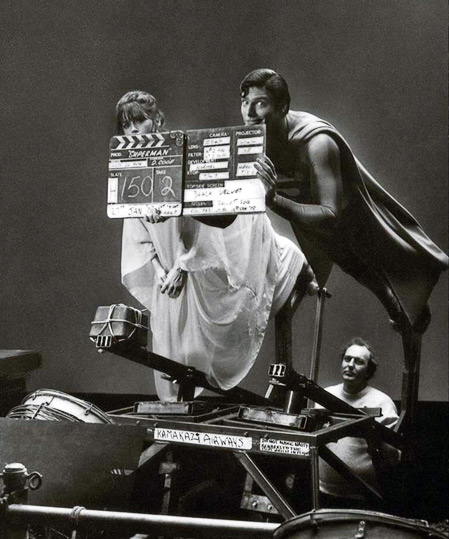
Coate: Were you a fan of the Superman character prior to seeing the 1978 movie?
Bowers: I was a regular viewer of the George Reeves television series, The Adventures of Superman, from about five years old throughout my pre-teen years. Comic books were never very accessible or of much interest. I was all about the live-action telling of Superman, Batman, Tarzan, Captain Marvel, Ultraman, and other fantastic heroes. Superman: The Movie is the primary reason I love the character and filmmaking in general.
Matessino: I wasn’t a comic book reader as a kid, but the George Reeves TV series was re-run in syndication constantly and the character also appeared on Saturday morning cartoons at the time, and I was a faithful watcher of both.
Scivally: Some of my earliest memories are of watching George Reeves in reruns of The Adventures of Superman. From as far back as I can remember, I was captivated by Superman. I think the character has enormous appeal for children, because when you are small and powerless, the ultimate fantasy is to be bigger and stronger, if not smarter, than everyone else. Throw in flying and bullets bouncing off your chest, and that’s just way cool.
Tye: Yes, I was fan from the days of George Reeves’ TV Adventures of Superman. He may not have been much of an actor, but he made kids like me believe.
Coate: How is Superman significant within the comic book/superhero genre?
Bowers: Superman: The Movie is the “grand daddy” of today’s superhero epics, a benchmark from which many directors and filmmakers, such as Patty Jenkins, director of Wonder Woman, continue to find inspiration and guidance. The first movie will forever resonate with moviegoers as the ultimate expression of hope, optimism, humility, selflessness, and a strong moral compass within the genre. Richard Donner’s careful direction, Geoffrey Unsworth’s dreamy cinematography, John Williams’ magical score, a multitude of ground-breaking visual and physical effects, exquisite writing, and superb acting all morphed into what is now considered a masterpiece of classic filmmaking. Richard Donner made Verisimilitude the watchword of the production: the mandate to make Superman: The Movie realistic and believable, with total respect and love for the material.
Matessino: Obviously Superman: The Movie is the template for every comic book superhero movie that followed. Prior to that, what immediately came to people’s minds was the 1960s Batman TV series. The 1978 film walked a fine line, incorporating just enough campy humor but treating the character seriously and depicting the world as a real one.
Scivally: Superman took a comic book subject and treated it with respect. After the campy 1960s Batman, that was a big deal. But, as creative consultant Tom Mankiewicz once said to me, the safe and easy way to do a superhero movie is to stand outside of it and make fun of it. What is more difficult — and more interesting — is to get inside the material and treat it with respect. While he was rewriting Superman for Richard Donner, the watchword was “verisimilitude” — they had to make it seem like it could actually happen. This was later reflected in the ad-line for the movie: “You’ll believe a man can fly.”
Tye: It was on his muscle-bound back that the genre was constructed. No need to say more.
Coate: Can you compare and contrast Christopher Reeve’s performance with that of other actors who have portrayed the character of Superman? Was Christopher Reeve the best Superman?
Bowers: George Reeves is my fatherly Superman, and Christopher Reeve is my brotherly Superman. Both actors had “it,” that special ingredient necessary to breathe life into the characters of Superman and Clark Kent come in a distinct and believable ways. Noel Neill told me on more than one occasion that Chris reminded her of George because they were both consummate gentlemen who loved the craft of acting first and foremost over their desire to become “movie stars.” Since Christopher Reeve was only nine years my senior, I could more easily identify with him as someone to aspire to and become in my own “humanly” way. His humility, vulnerabilities, strengths, and selflessness brought peace and clarity to my teenage and 20-something years, and later in real life after his 1995 accident. I was completely captivated by Christopher Reeve in 1978 because he possessed such genuine energy… so authentic and honest. He really did feel like a true “friend.” Was Chris Reeve the best Superman? Sure was. Sure is!
Burns: Reeve was the best.
Matessino: I think all of the actors who’ve portrayed Superman over the years were well chosen in the sense that each had an instinct about what the character meant for the time in which each played the role. Christopher Reeve was the first one to plausibly deal with the conceit of why no one could recognize that Clark Kent was Superman with glasses on. He played Clark exactly like what he would really be… a farm boy totally overwhelmed by the big city. It didn’t feel like something he was doing just to conceal his identity. It therefore felt relatable. It tapped into that sense we all have that there is an ideal, confident, balanced person inside each of us.
Scivally: Looking at the actors who have portrayed Superman on film and TV, Kirk Alyn was pretty much a stock serial hero, without a lot of shadings to his portrayal – but then the serials never had characters who were more than one or two-dimensional. George Reeves gave two performances as Superman. In the first couple of seasons, his Superman is a tough crime-fighter. In the later seasons — the ones made after Dr. Frederick Wertham’s notorious attack on comic books — he’s a much jollier, affable Superman. His portrayal of Clark Kent softened as well, though there was never much differentiation between his Kent and his Superman; his early Kent was a tough, no-nonsense reporter who would have been at home in a Humphrey Bogart crime thriller. Looking back at the shows now, George Reeves’ Superman is like a surrogate parent, with Lois and Jimmy his children that he has to keep in check and keep rescuing from trouble. It was a pretty innocent portrayal for a much more innocent time. There wouldn’t be another major live-action portrayal (outside of TV commercials) until Christopher Reeve twenty years later. By that time, the country had experienced the Vietnam War and Watergate, so the wide-eyed innocent approach wouldn’t have resonated with a much more cynical, jaded era. Consequently, Christopher Reeve — under Donner’s direction — gave more shadings to Clark Kent and Superman. For the first time, audiences could see a hint of sadness and loneliness in the character, and Reeve made a much greater effort to play Kent and Superman as different individuals, which helps sell the illusion that Lois Lane wouldn’t be able to see past the whole eyeglasses-as-disguise bit. While his Superman is a confident charmer, his Clark Kent is a shy, bumbling Jimmy Stewart type. Or, as Reeve put it, his Kent is a put-on, a reflection of the way the alien Kal-El (Superman) sees us.
Tye: Hands-down the best, in part because he let us see the differences between Clark and Superman. The only other Superman to do that was Bud Collyer on the radio.
